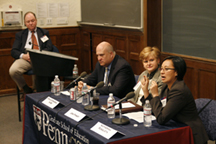Higher Education and the Economic Downturn: Crisis or Opportunity?
 Speaking at a panel discussion on the economy and higher education, Joni Finney told a packed house that the current crisis could provide "the perfect opportunity for reform."
Speaking at a panel discussion on the economy and higher education, Joni Finney told a packed house that the current crisis could provide "the perfect opportunity for reform."
Finney, a professor at Penn GSE and expert on higher education policy, argued that money from the Obama stimulus package should be used to target innovation, with appropriations going toward funding students rather than institutions. "The worst that could happen to American higher education is ... that we don't embrace reform," she said.
Finney was speaking at the annual Gordon S. Bodek Lecture of Distinguished Educators, held annually at the University of Pennsylvania. Joining her on the panel were Penn Executive Vice President Craig Carnaroli and Social Policy and Practice Professor Katherina Rosqueta. Bob Zemsky, a professor at Penn GSE, moderated.
Though no single conclusion was reached, all the participants saw the economic crisis as a tipping point for the higher education industry.
Carnaroli, the University's most senior non-academic officer, argued that the economy is experiencing a true financial crisis rather than a business-cycle recession and foresaw more closures and more consolidation at institutions of higher education. He even raised the specter of a new model for universities, one with no athletic teams, no fraternities and no tenure but with a highly paid, star faculty.
Rosqueta, director of Penn's Center for High Impact Philanthropy, also addressed the question of consolidation. She described the bewilderment of people in the business sector when they see non-profits, faced with an environment of decreasing capitalization, failing to pursue strategies of merger and collaboration. "I'm keenly aware of ... just how inapplicable some of the actions you would take in a business environment are to a mission-focused institution," she said.
Nonetheless, she added, "It would be a good thing to have a university like ours not be defensive about not having explored those options, but instead meet those questions."
Zemsky, one of the country's leading experts on higher education, discussed the impact of the for-profits like the University of Phoenix. A true network, Phoenix treats "every node on the network as an equal portal. So you never have any large discussion at Phoenix about transferring credits," he explained.
"And while this won't impact Penn, it is beginning to impact the state systems," he continued, citing the example of the chancellor of the University of Ohio who hopes to transform a system of historically independent campuses into a unified network where "the whole thing is the brand."
For a video of the discussion, click here.
Photo (left to right): Penn GSE Professor Bob Zemsky (moderator), Penn Executive Vice President Craig Carnaroli, Penn GSE Practice Professor Joni Finney, and Social Policy and Practice Professor Katherina Rosqueta.
The Gordon S. Bodek Lecture of Distinguished Educators was made possible through the generosity of Gordon S. Bodek, C'42, and active alumnus, Trustee (Emeritus), and former member of the Penn GSE Board of Overseers. Bodek established a lecture in 1993 to provide a forum for leaders of the educational community to discuss significant issues affecting the profession. This year's event was co-sponsored by Penn GSE and the Penn Alumni Office.
